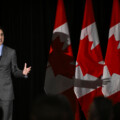At the last G7 meeting in Southern Italy, one clear winner emerged: Italy’s Giorgia Meloni. In office as prime minister for only two years, she is one of Europe’s most popular leaders, while her Brothers of Italy party made impressive gains in the recent election to the European Parliament. None of this was predicted when she was first elected when the media quickly doubted her talents and abhorred her party’s fascist past.
As the Wall Street Journal editorial stated, Meloni is the only leader who may not be a political lame duck. In contrast, Britain’s Rishi Sunak looks to go down in the U.K.’s election on July 4; German Chancellor Olaf Scholz’s coalition party took a beating in the European elections, as did Emmanuel Macron with the rise of Marine Le Pen’s National Rally. Japan’s Fumio Kishida has abysmal approval ratings, while U.S. Democrats see their leader quickly fading and fearing the worst in Biden’s debate with Trump on June 27. At home, Canadians are counting the days to the national elections next year.
How has Meloni managed to avoid the fates of her male counterparts while gaining popularity in the process? What lessons can conservative leaders learn from her success, including Pierre Poilievre? Here are five lessons they should keep in mind.
First, tradition and identity matter. Giorgia Meloni never hid her pride as an Italian, a mother, a woman, and a Christian. It would be hard to live in Italy and deny the importance of tradition and the family, while most social scientists see them as impediments to progress.
Shame never occurred to Meloni when defending her identity and national pride, though they were ridiculed as sexist, homophobic, and elitist. Meloni pushed hard against the postmodern notion that values and morality are relative. The louder she proclaimed her independence on what her values were, the more they were met with wide support from a public that thirsted for someone to reflect what many believed but were too frightened and intimidated to say out loud. In contrast with U.S. Supreme Court Justice Ketanji Brown Jackson, who refused to define a woman at her confirmation hearings, Meloni knows exactly what a woman is.
Second, the importance of history and culture. If there is one damaging aspect to hyper-liberal progressive thought, it is the importance of crushing history and traditional culture. Both are seen as an opening to conservative, reactionary thought where the solution is to repress the temptation to learn from the past. Progressives demand that history must answer to the present for the sins of patriarchy, subjugation of women, homophobia, and white supremacy. A nonsensical notion, of course. Meloni’s appeal is her support of Italian culture in all its forms and history, good and bad. Strong leaders don’t run from the past.

Italy’s Premier Giorgia Meloni, Hungary’s Prime Minister Viktor Orban talk to the press in Rome, June 24, 2024. Andrew Medichini/AP Photo.
Third, know that the media is not your friend. It would be hard to believe that Meloni has or takes seriously advisors on handling the media. The national and international press has always introduced her as the far-Right Italian leader, never failing to mention her party’s fascist past. She revels in the name-calling, referring to herself as “that bitch Meloni,” turning a liability into an advantage as the underdog fighting an elite press that wants to see her fail. This is a lesson Canadian conservatives too often fail to heed. Just know that whatever you do, you will be labelled a fascist, no matter how fair or not.
Fourth, moral clarity on international affairs. When many conservative or right-wing politicians are seduced by authoritarian leaders, including Vladimir Putin, Meloni knows right from wrong and would never follow the same path as Hungary’s Viktor Orban, who has become a mouthpiece for the Russian leader and an apologist for Putin’s barbaric war against Ukraine. She also is a strong supporter of Israel in its war with Hamas and won’t waiver. Meloni supports a strong NATO, and the money to back it, as any real conservative should do.
Fifth is the problem of immigration. Meloni and her party were elected to stop illegal immigration, a problem that has changed the political landscape of the European Union and the U.K. So far, she has disappointed her supporters. Paying off Tunisia hasn’t worked while the EU refuses to allocate funds to help resettle the thousands that land on easy-to-reach Italian islands in the Mediterranean. Meloni knows that uncontrolled immigration might determine her political future. If Biden loses in November, illegal immigration will be at the top of the list. Poilievre should take heed of the lessons here.









